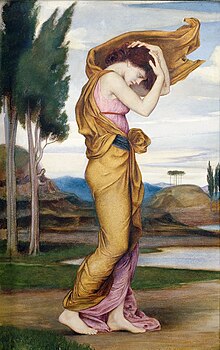
Back Deyanira Azerbaijani Дэяніра Byelorussian Деянира Bulgarian Deianeira Breton Deianira Catalan Déianeira Czech Deïaneira German Δηιάνειρα Greek Dejaniro Esperanto Deyanira Spanish
| Deianira | |
|---|---|
Princess of Calydon | |
| Member of the Calydonian Royal House | |
 Deianira by Evelyn De Morgan | |
| Other names | Deïanira, Deianeira, Diyeneira, Deyanire, or Dejanira |
| Abode | Calydon |
| Genealogy | |
| Parents | Althaea and Oeneus or Dionysus or Dexamenus |
| Siblings | Meleager, Toxeus, Clymenus, Periphas, Agelaus, Thyreus, Gorge, Eurymede, Mothone, Perimede, Melanippe, and Tydeus (if Oeneus was her father) Eurypylus, Theronice and Theraephone (if Dexamenus was her father) |
| Consort | Heracles |
| Offspring | |
Deianira, Deïanira, or Deianeira[1] (/ˌdiːəˈnaɪrə/ DEE-ə-NY-rə;[2] Ancient Greek: Δηϊάνειρα, romanized: Dēiáneira, or Δῃάνειρα, Dēáneira, IPA: [dɛːiáneːra]), also known as Dejanira,[3] is a Calydonian princess in Greek mythology whose name translates as "man-destroyer"[4] or "destroyer of her husband".[5][6] She was the wife of Heracles and, in late Classical accounts, his unwitting murderer, killing him with the poisoned Shirt of Nessus. She is the main character in Sophocles' play Women of Trachis.
- ^ Chisholm, Hugh, ed. (1911). . Encyclopædia Britannica. Vol. 13 (11th ed.). Cambridge University Press. p. 346.
- ^ Wells, John C. (2009). "Deianira". Longman Pronunciation Dictionary. London: Pearson Longman. ISBN 978-1-4058-8118-0.
- ^ Baynes, T. S., ed. (1878). . Encyclopædia Britannica. Vol. 7 (9th ed.). New York: Charles Scribner's Sons. p. 37.
- ^ P. Walcot, "Greek Attitudes towards Women: The Mythological Evidence" Rome, 2nd Series, 31:1:43 (April 1984); at JSTOR
- ^ Koine. Y. (editor in chief), Kenkyusha's New English-Japanese Dictionary, 5th ed., Kenkyusha, 1980, p.551.
- ^ Antoninus Liberalis, Notes and Commentary on Meleagrides sv. Deianira, p.111